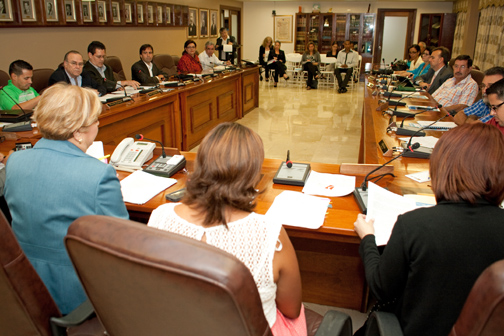Retailers: If Treasury wants to increase collections, it must fix system


A significant group of small retailers met last week to discuss their concerns over the possible elimination of the B2B sales tax exemption.
Worried about the potentially harmful effects that eliminating the business-to-business sales tax exemption would have on their businesses, retail executives recently concluded that if the Treasury Department want to increase its revenues, it needs to “correct and streamline” the process of capturing the sales and use tax to collect from evaders.
During a meeting last week at the United Retailers Association’s Hato Rey headquarters, representatives from different sectors presented their arguments for how the amendments proposed by House Bill 1073 would affect them adversely.
“We already met with the governor to discuss this issue because we have serious concerns,” said Enid Monje de Pastrana, president of the trade group known as CUD for its initials in Spanish.
“If they’re going to remove the exemption in B2B sales, they should do it by volume to avoid overloading the small retailer because their profit margin is lower and this would further reduce their cash flow,” she said.
“On the other hand, the law is unclear about how it will collect the 50 percent of the sales and use tax that all businesses must pay. The law has to be clear about what the mechanism is to collect this money and not wait for it to be defined by regulations.”
The best way to prevent tax evasion is to collect it when goods arrive to Puerto Rico, she said.
“But if this option is not possible, it should be done using technology to automatically remit payments to the Treasury Department,” Monje added. “Increasing prices or bearing the cost of the sales and use tax in operating expenses is unreasonable for a small merchant whose profit margin is limited or their line of business is in a very competitive market. It could lead to bankruptcy.”
Sectors speak out
During the meeting, several representatives from the small industry sector explained how they would be affected if they had to start collecting sales and use tax.
Miguel Rivera, legal advisor to the WIC Retailers Association, said all components of the chain — from distributors to store owners — charge each other the sales and use tax.
However, taxes cannot be charged to participants on transactions based on the redemption of the WIC check, either directly or indirectly, he said.
“Therefore, I cannot recover the tax that I have paid on merchandise for resale through the WIC check. That increases my cost of operation, not sales, because I cannot increase the price,” Rivera said. “At a time when profits are so limited, this adds such as high cost that it could mean the closure of 300 or 400 businesses easily because between 60 percent and 70 percent of revenue for these small stores comes from the redemption of WIC checks.”
Meanwhile, Tamara Pérez, president of the Federation of Long Term Care Centers, expressed concern about having to apply taxes to services offered to elderly who mostly depend on their Social Security checks to live, or handicapped youth whose parents work several jobs to be able to pay for their care.
“It is curious that the bill provides an exemption to child care, an industry with similar regulations and services as extended care to elderly people, and we do not have this exemption,” Pérez said. “This is worrying and we want it to be resolved in the best way possible.”













Not remitting 7¢ collected as sales tax on a $1 sale is not simply tax evasion but a case of illegal appropriation of public finds with a multi-year sentence not subject to suspension or parole. Prosecute and jail one small business owner, one medium business owner and the executive of one large business guilty of illegal appropriation of public funds and sales tax remittances to Hacienda will rapidly grow from lackadaisical PR levels (50-55%) to U.S. standards (75%-plus).